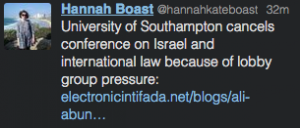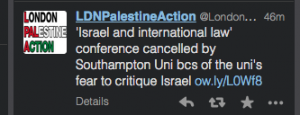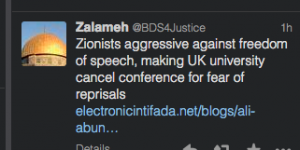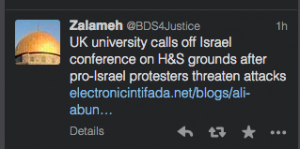According to a statement from the organisers, the conference on Israel and international law, scheduled to take place next month, is now to be cancelled by the university on health and safety grounds. However the university’s official position is that the situation is still under review, and a final decision will be made public tomorrow.
Many interesting points were raised in the thread following the Engage post I linked to last week. One strand focused on the tactical disadvantages of stopping the conference going ahead:
It would be unfortunate of this conference was cancelled because this would be grist to the mill of antisemitic conspiracy theories of shadowy forces that prevent open debate about Israel. Also despite the hugely overblown claims of the conference organisers to its uniqueness, it probably won’t have much impact beyond the BDS circles who would attend these events anyway.
That was one reason – not the only one – why I opposed cancellation. But I also thought this, in response, was a very valid point:
My only divergence with you (and Larry) is the reference to adding ‘grist to the mill of antisemitic conspiracy theory’. Conspiracy theory (antisemitic or not) is irrational pure and simple. It does not depend for its power of persuasion on the actions and reactions of those it targets. Indeed, I am quite sure that your (rational) defence of the conference that you have outlined could quite easily be incorporated within such an (irrational) theory. Finally, and specifically, I think we hit dangerous ground when anti-racist and anti-anti-Semitic responses is guided, even to a tiny extent, by the the so-called thoughts of racists and anti-Semites (conspiracy theorists or not), since to do so in its own way grants such ‘thinking’ a legitimacy it does not and never deserves.
Now that the conference’s cancellation is being reported, it’s revealing to look at some of the reactions. The organisers believe that the university has overstated the health and safety risks, and maintain that the police are able and willing to handle any possible problems. They continue:
We feel that the manner the university communicated with the police and conducted the risk assessment shows that the security argument was used to rationalise a decision to cancel the conference that has been taken under public pressure of the Israeli Lobby.
It’s difficult to evaluate their analysis without further information, and without, as yet, any official statement from the university. It’s true that there has been a good deal of pressure on Southampton from those opposed to the conference. Some of these agree with the organisers that the ‘health and safety’ concerns are a face saving excuse. The Zionist Federation apparently hopes the University listened to the 6000+ signatories who called for cancellation. But it wouldn’t be the first time a university event had been cancelled on health and safety grounds.
Not surprisingly, some are already offering a further tendentious spin on the cancellation news. The Health and Safety issue is brushed aside completely in the Electronic Intifada’s headline:
Univ. of Southampton cancels conference after government, Israel lobby pressure
‘After’ quickly becomes ‘because’ on Twitter:
Here’s another unedifying response.
Although some supporters of Israel think and hope their campaign played a part in the university’s (alleged) decision, they wanted to influence by persuasion, citing concerns about antisemitism. However some of their opponents, equally keen to implicate Zionists in the decision, are employing quite different rhetoric:
Zalameh has so far failed to respond to my question about exactly which pro-Israel protestors had threatened attacks.
Update Here’s another dodgy response.







